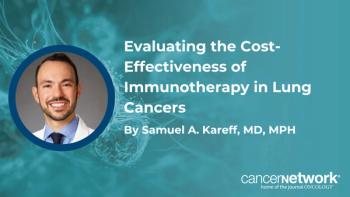
Oncology NEWS International
- Oncology NEWS International Vol 14 No 3
- Volume 14
- Issue 3
NCI Addresses Tobacco- Related Cancers in Women
This special “annual highlights” supplement to Oncology News International is acompilation of major advances in the management of lung cancer during 2004, asreported in ONI. Guest editor Dr. Roy Herbst discusses these advances in clinicalmanagement, with a focus on developments in adjuvant therapy for early disease,targeted therapy, and new chemotherapy findings.
BETHESDA, Maryland-Aworking group of the National CancerInstitute (NCI) has released a seriesof recommendations aimed atstimulating scientific research intotobacco-related cancers in women andtranslating discoveries into evidencebasedinterventions to prevent thecancers worldwide.The report, "Women, Tobacco,and Cancer: An Agenda for the 21stCentury," noted that the incidenceand mortality rates of smoking-relatedcancers in US women soared duringthe second half of the 20th century.Lung cancer mortality in womenincreased 600% between 1950 and1997, making it the leading cause ofcancer death in females.The NCI working group comprisedexperts from the institute, other federalagencies, nongovernment researchinstitutions, and advocacygroups. Members drew in part on informationcontained in several recentreports, including the 2001 SurgeonGeneral's report, "Women and Smoking,"which highlighted the importanceof gender-specific research intotobacco use and effects.The panel set several key goals forfuture research into tobacco-relatedcancers in women:
- Increase our understanding ofsex differences across the broad rangeof research on women, tobacco, andcancer.
- Develop new and more effectiveinterventions to prevent and treat tobaccouse and environmental tobaccosmoke exposure among womenand girls, especially in populations atgreatest risk; expand partnerships,networks, and innovative researchplatforms to ensure the widespreaddelivery of these interventions.
- Improve national and globalevaluation and surveillance of thehealth hazards related to tobacco useand ETS exposure, specifically, ofwomen's and girls' knowledge, attitudes,and behaviors related to tobaccouse and associated risks.The working group emphasizedthat there is a critical need to betterunderstand sex differences as they relateto all phases of tobacco addictionand tobacco-related diseases."This includes genetic, molecular,cellular, neurobiological, biobehavioral,and hormonal factors thatplay a critical role in tobacco addictionand in the etiology of cancersand other diseases caused by tobacco,"the working group stated.Researchers also need to decipherthe etiologic role of gene-hormoneenvironmentinteractions in the cancers,and discover new methods forprevention and treatment of tobaccoaddiction. In addition, the NCI panelsaid that development of better treatmentand prevention techniques requiresidentifying the behavioral,psychosocial, sociocultural, and environmentalfactors that influence tobaccouse, exposure to second-handsmoke, and disease risk.
Translating basic and applied researchinto effective interventions willdepend on advances in four areas:
- Using evidence from animalstudies, pilot projects, and small clinicaland community studies to developnew interventions for prevention,cessation, and treatment.
- Finding ways to use or modifyexisting infrastructures to rapidly evaluatethe efficacy of promising treatmentsand the effectiveness and costefficiencyof proven small-scaleprograms and policies.
- Exploring and strengthening thepositive health effects of tobacco-control policies on women and girls.
- Monitoring the harmful effectsof tobacco marketing on females.
Delivering the proven results of researchand development efforts willdepend on finding ways to increasethe appeal, access, affordability, anduse of effective interventions, theworking group said. This, in turn, willrequire identifying and targeting messagesand strategies that successfullyinvolve individuals and organizationsin evidence-based tobacco-controlpolicies. Data from research-includingsurveillance, policy, economic,and cultural studies-need to be moreavailable to health care workers, policymakers, and the public, the paneladded.The NCI report also stressed theimportance of partnerships betweengovernment agencies, nongovernmentorganizations, private foundations,corporations, academic institutions,and community groups in acceleratingprogress in tobacco-related interventionsaimed at women and girls.Finally, the panel cited the importanceof local, national, and worldwideevaluation and surveillance indetermining the progress of efforts toreduce tobacco use, ETS exposure,and tobacco-related cancers amongwomen and girls, and to make changesin programs when needed.
Articles in this issue
almost 21 years ago
Smoking Speeds Progression of Pancreas Caalmost 21 years ago
Alcohol, Obesity, and Smoking Risk Factors for HCCalmost 21 years ago
Adding Bevacizumab Improves Response to Oxaliplatin Regimensalmost 21 years ago
Capecitabine Promises Convenience, Efficacy in LARC, Five Studies Showalmost 21 years ago
Avastin Enhances FOLFOX Efficacyalmost 21 years ago
Panitumumab, Anti-EGFR MoAb,Promising in Colon Canceralmost 21 years ago
Oxaliplatin/Gemcitabine Effective in Advanced Pancreatic Canceralmost 21 years ago
Study Strengthens Evidence of Link Between Liver Cancer and Diabetesalmost 21 years ago
Capecitabine Promises Convenience, Efficacy in LARC, Five Studies ShowNewsletter
Stay up to date on recent advances in the multidisciplinary approach to cancer.
Related Content




Evaluating the Cost-Effectiveness of Immunotherapy in Lung Cancers












































